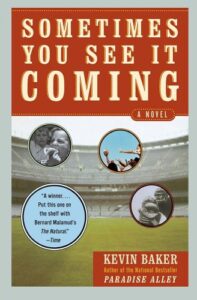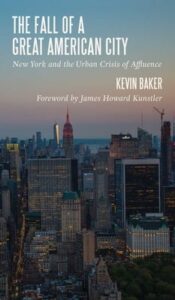Kevin Baker: The New York Game: Baseball and the Rise of a New City
July 30, 2024 by David
Filed under Non-Fiction, WritersCast
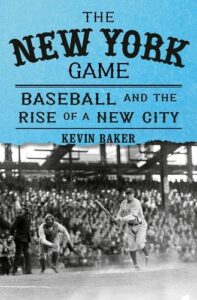 The New York Game: Baseball and the Rise of a New City — Kevin Baker — Knopf Publishing – 9780375421839 – Hardcover — 528 pages — $35.00 — March 5, 2024 — ebook versions available at lower prices
The New York Game: Baseball and the Rise of a New City — Kevin Baker — Knopf Publishing – 9780375421839 – Hardcover — 528 pages — $35.00 — March 5, 2024 — ebook versions available at lower prices
I am guessing that anyone who knows me well will be aware that baseball has been a lifelong passion. I’ve written baseball poetry and stories, interviewed former players, and talked to writers about baseball many times over the years. I’ve read hundreds of baseball books, and published a few as well. Among the legion of great baseball novels, Kevin Baker’s Sometimes You See it Coming is one of my all time favorites. And of all the nonfiction baseball books I’ve come across, his newest book, The New York Game is among the very best.
In this The New York Game, Kevin tells the history of America’s greatest city through the lens of America’s greatest game. He is a masterful story teller, weaving together multiple strands of cultural, political, economic, and geographic history to create a brilliant tapestry from the beginning era that baseball was invented in the New York City environs, through its glory years, ending with World War II (and leaving us waiting for the sequel that will cover the 80 years since).
One element that sets this book apart from so many other books about baseball history is that Baker seamlessly writes about the often overlooked stories of Black and Hispanic baseball players and particularly the crucial importance of the Negro Leagues in American sports history. Race and sports reflect back all the flaws and foibles of the American experiment in sometimes painful and jarring ways. Understanding (and facing) how baseball – its ownership, management, players, and fans – dealt with race and racialism over the course of American history is crucial to understanding who we are today.
Even readers who think they know all about New York City baseball will learn from this book, and will enjoy Baker’s stories about the game, always cast in his fast-moving, highly literate style. There are so many stories, vignettes, portraits and analyses, it is impossible to list them all, not just the already famous, but many figures even those of us who have studied baseball or grew up in New York will have heard of before.
I’ve interviewed Kevin twice before for Writerscast, including for his excellent socio-political economic book about modern New York City, The Fall of a Great American City. (co-published by City Point Press and Harper’s Magazine in 2019).
I cannot recommend this new book more highly, even for those who do not identify as baseball fans. Not only will you gain a deeper understanding of the history of our largest and most dynamic city, you’ll be entertained throughout by a master storyteller. It’s one of those rare books you will have trouble putting down once you start reading.
Writerscast interview with Kevin about The Fall of a Great American City
Podcast: Play in new window | Download
Thom Hartmann: The Hidden History of the Supreme Court and the Betrayal of America
October 22, 2019 by David
Filed under Non-Fiction, WritersCast
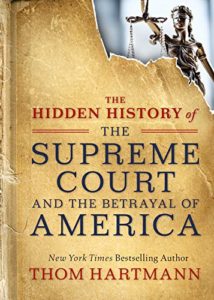 The Hidden History of the Supreme Court and the Betrayal of America – Thom Hartmann – ISBN 9781523085941 – Berrett-Koehler Publishers – Paperback – 192 pages – $15.00 – October 1, 2019 – ebook versions available at lower prices
The Hidden History of the Supreme Court and the Betrayal of America – Thom Hartmann – ISBN 9781523085941 – Berrett-Koehler Publishers – Paperback – 192 pages – $15.00 – October 1, 2019 – ebook versions available at lower prices
“Hartmann delivers a full-throated indictment of the U.S. Supreme Court in this punchy polemic.” —Publishers Weekly
This is a really important (and very short) book – so you have no excuse not to read it – no matter how busy you are.
Thom Hartmann has been a popular progressive radio host for years. In this book, he carefully and succinctly explains how the Supreme Court has gone far beyond its actual Constitutionally derived powers and provides some cogent guidance on how we can change it.
In the beginning, and until 1803, the Supreme Court was simply viewed as the final court of appeals in the judicial system, the branch of government with the least power of the three set forth in the Constitution. So we have to find out how did the concept of judicial review start, and as Hartmann points out, it began with the battle between the Federalists and Anti-Federalists, with the now well-known case known as Marbury v. Madison.
It is Hartmann’s view, and he argues persuasively, that it is not the role of the Supreme Court to decide what the law is, but rather the duty of the people through the legislative branch. He summarizes the history of the Supreme Court, giving some important examples of cases where the Supreme Court appears to have overstepped its constitutional authority.
So much of our history and beliefs about this country are mystified by a sort of glorification of a romanticized and suspect view of the Constitution and the powers of our branches of government. The Supreme Court today reflects the concerted effort of a small segment of society to control and reduce democratic principles and practices that would harm their interests. Hartmann’s book is an essential and very handy guide for anyone who would like to explore what we can do to rein in the power of the courts and increase democracy in our country. If you read Nancy McLean’s Democracy Unchained, as I hope you have, or if you are simply interested in both protecting and expanding democracy in our country, then reading this book is essential.
Buy the book from RJ Julia bookstore here.
Thom Hartmann is a progressive syndicated talk show host whose shows are available in over a half-billion homes worldwide. He’s the New York Times bestselling, 4-times Project Censored Award-winning author of 24 books in print. His radio show is syndicated on for-profit FM and AM radio stations nationally, on non-profit and community stations nationwide by Pacifica, across the entire North American continent on SiriusXM Satellite radio, on cable systems nationwide by Cable Radio Network (CRN), via subscription audio podcasts, worldwide through the US Armed Forces Network, and through the Thom Hartmann iOS and Android apps. Visit Thom’s own website to learn more about his work and many useful books. 
Podcast: Play in new window | Download
Jane Ziegelman and Andrew Coe: A Square Meal: A Culinary History of the Great Depression
July 17, 2017 by David
Filed under Non-Fiction, WritersCast
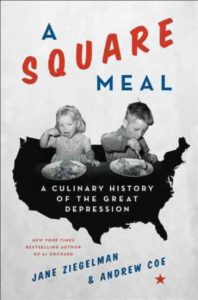 A Square Meal: A Culinary History of the Great Depression – Jane Ziegelman and Andrew Coe – HarperCollins – paperback now available – 9780062216427 – 336 pages – $15.99 – ebook versions available at lower prices.
A Square Meal: A Culinary History of the Great Depression – Jane Ziegelman and Andrew Coe – HarperCollins – paperback now available – 9780062216427 – 336 pages – $15.99 – ebook versions available at lower prices.
First, let me say that this is one of the most interesting, readable and thought-provoking works of American history I have read in a long time. It’s interesting to think about how two writers can work together to create a consistent and compelling authorial voice – Andrew and Jane have done that brilliantly. One must assume they have a very special marriage that enables them to both collaborate and live happily together.
If you are interested in food and how the American palate has changed over time, this book will certainly have much to offer. But I think the story here is broader than it may first appear. It’s not just a “culinary history” but a comprehensive social history of one of the most important periods of American life told through the issues surrounding food and nutrition in a challenging time.
Yes, it is “an in-depth exploration of the greatest food crisis the nation has ever faced – and how it transformed America’s culinary culture,” but I think the larger story is that this book uses food as the lens to through which to view how Americans lived during our greatest economic and cultural crisis.
History writing that brings the past to life and engages us in the human dimensions of the big moments of the past is real storytelling. This kind of writing helps us understand and sympathize with the people who came before us. It makes us better able to deal with our own crises, of which there are indeed many.
So this book is important whether food is “your thing” or not. I’d recommend reading it no matter your specific interests, just because it will make you think, will make you care, and will help you to feel that the past really is always prologue. It was a great pleasure to have the opportunity to talk in person with Jane and Andrew about A Square Meal.
Jane Ziegelman is the director of the Tenement Museum’s culinary center and is founder and director of Kids Cook!, a multiethnic cooking program for children. Her writing on food has appeared in numerous publications, and she is the coauthor of Foie Gras: A Passion.
Andrew Coe is a writer and independent scholar specializing in culinary history, and the author of Chop Suey: A Cultural History of Chinese Food in the United States, which was a finalist for a James Beard Award. He appeared in the documentaries The Search for General Tso and Eat: The Story of Food. Jane and Andrew live in Brooklyn, New York. And recently, A Square Meal was announced the winner of the 2017 James Beard Award for best nonfiction book of the year.
NPR’s Fresh Air did a wonderful interview (called “Creamed, Canned and Frozen”) with Jane and Andy about this book in August, 2016. And I interviewed Andy about his book, Chop Suey for Writerscast a few year ago.
Photo of the authors by Sasha Maslov for The New York Times.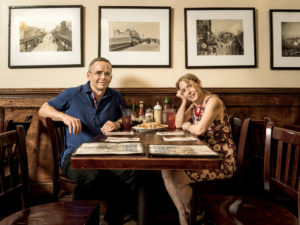
Podcast: Play in new window | Download
Philipp Meyer: The Son
July 14, 2013 by David
Filed under Fiction, WritersCast
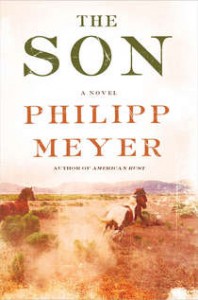 978-0062120397 – Ecco Press – Hardcover – $27.99 (ebook editions available at lower prices)
978-0062120397 – Ecco Press – Hardcover – $27.99 (ebook editions available at lower prices)
It is wonderful these days to come across a novel with big ambitions. It is even better to come across one that succeeds so brilliantly as The Son, which is only the second novel by Philipp Meyer. His first book, American Rust, was published in 2009.
The Son is rooted in Texas, which gives Meyer the chance to be epic, as the place itself, so large and so much a part of the romantic history of the American West, enables story telling on a grand scale. There are three generations of stories in the novel, told in three separate voices, all of members of the same family, living out the story of European America. It’s a terrific story, complicated and sometimes challenging to keep straight whose voice you are hearing, which period you are in, but I was hooked from the outset of the book and could not put it down. Admittedly, I am a sucker for stories that show American Indians as real people, not as stick figures, and which admit (and celebrate) the complexity of human beings rather than trying to judge them from the perspective of the present.
Meyer is a terrific writer throughout. To be this good so early in his career may put alot of pressure on him going forward. It is difficult for any writer to continually come up with great stories and tell them well. Talking to Meyer here about his work, and about how he came to write The Son, I gained a good deal of respect for this writer and his literary vision. The next book I am reading this summer is American Rust and I am going to be looking forward to Meyer’s next book, which I hope to be reading in the not too distant future. Philipp Meyer is the real deal, a great writer telling stories of America that help is define who we are in this late era of the American Empire. 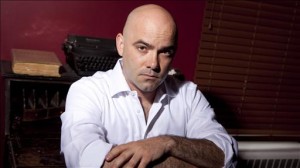
*Note to listeners – Meyer and I had an unusually long conversation, this interview runs a bit more than 42 minutes, I hope well worth your while to hear all the way through.
Podcast: Play in new window | Download
Karl Marlantes: What It Is Like to Go to War
October 2, 2011 by David
Filed under Non-Fiction, WritersCast
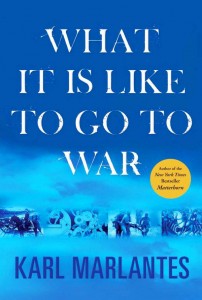 978-0802119926 – Atlantic Monthly Press – Hardcover – $25.00 (e-book and audiobook editions available)
978-0802119926 – Atlantic Monthly Press – Hardcover – $25.00 (e-book and audiobook editions available)
I read Karl Marlantes’ novel, the extraordinary Matterhorn last year (and interviewed him about it for Writerscast – you can listen to that interview here). I don’t think I am alone in believing that Matterhorn is perhaps the finest and most important war novel of the Vietnam generation; for me at least, it belongs in the pantheon of great American war novels (going back to WWI, Thomas Boyd’s Through the Wheat is another great novel written by an former Marine).
It took Karl Marlantes more than 30 years to write and publish the novel we read as Matterhorn its final form. His new book, What It Is like to Go to War, now follows as a deeply thoughtful and moving work of nonfiction about the nature and meaning of war, and what it means to the individual warriors who participate who fight, as well as to the society that gives them that responsibility.
There are many parallels between the two books. I’d recommend you take on the novel first, spend some time thinking about its story and characters, and then move on to this new work of nonfiction, which is a combination of personal memoir, meditation and social, political and cultural analysis and polemic.
Insofar as fiction gives us our deepest emotional and spiritual truths, Matterhorn cannot fail to move you and allow you to feel the reality of what it is like when our best and brightest go to war. Then What It Is Like to Go to War gives us another carefully wrought perspective, what Marlantes has learned from his own experiences and from many years of studying and thinking about war and society.
And we should all be paying attention to what he says here. America has had more people fighting wars for a longer period of time than at any other time in our history. Indeed what does this say about contemporary American society?
In 1969, when he was just 23, Karl Marlantes was an inexperienced lieutenant in charge of a platoon of Marines whose lives were in his hands. His experiences in the jungles of Vietnam , molded and shaped him throughout his life. He has thought deeply about his wartime experiences, how they affected him and his comrades, as well as how other soldiers before and since have gone through similar experiences. In What It Is Like to Go to War, Marlantes weaves accounts of his own combat experiences with analysis, self-examination, and powerful ideas drawn from his wide reading from Homer to the Mahabharata to Jung.
Unlike many of us who feel that war must be ended in modern society, Marlantes starts from the belief that war is an inevitable component of societal and political being. What he is after is to make us think about preparing warriors not for fighting, which we already do quite well, but for living with the effects on those who go to war that derive from participating in the morally unnatural but societally sanctioned acts of killing other human beings.
Most societies that preceded us have used powerful rituals, myths and ceremonies to integrate acts of war into the fabric of their cultures, and to reintegrate their warriors thoroughly into their societies, while our secular, materialist society really offers no tools or methods to warriors (or for that matter to civilians) to create a holistic “story” of why and how war is meaningful and necessary.
One of the many points he made in this book really struck me is that those who send men and women to war are themselves warriors, that actual soldiers (as opposed to guns and bombs) are their weapons. These individuals must fully comprehend what they do, and must find ways to integrate their own acts of war as much as the soldiers on the battlefield who wield the weapons and who witness so much death and destruction on both sides of battle.
I found that the author’s afterword to the book was very important to my understanding and acceptance of his work:
“We must be honest and open about both sides of war. The more aware we are of war’s costs, not just in death and dollars, but also in shattered minds, souls, and families, the less likely we will be to waste our most precious asset and our best weapon: our young.”
“The substitutes for war…are spirituality, love, art, and creativity, all achievable through individual hard work.”
I can’t recommend this book to readers enough. It’s book that, like the work of my friend, Paul Chappell, (Will War Ever End and The End of War) has the potential to shift our societal dialogue about war and what it can and should mean to a modern society.
There’s a fine review of What It Means to Go to War in the NY Times and a very worthwhile interview with Karl on Livewriters about Matterhorn.
Podcast: Play in new window | Download
Bill Barich: Long Way Home: On the Trail of Steinbeck’s America
October 23, 2010 by David
Filed under Non-Fiction, WritersCast
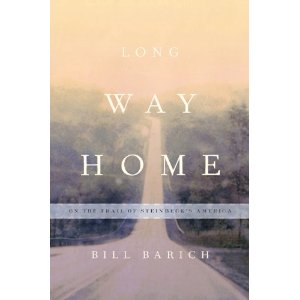 978-0802717542 – Walker & Co. – Hardcover – $26.00 (e-book version also available)
978-0802717542 – Walker & Co. – Hardcover – $26.00 (e-book version also available)
Bill Barich is a fine writer, comfortable with words, a natural storyteller who is self-aware and a careful observer of character as well as landscape. He’s got a great narrative voice that makes his books very easy to read and deeply engrossing.
In the summer of 2008, Barich, who has lived in Dublin, Ireland for some time, decided to take a journey across America, essentially following in the footsteps of the great John Steinbeck, who made the cross-country journey (ostensibly to rediscover America, but more likely a stab at rediscovering his own literary voice, which resulted in Travels with Charley in 1962).
Of course Barich and Steinbeck differ in significant ways. And the early 1960’s were a very different time than 2008 for America. Barich’s trip came at the time of our massive economic collapse, and the rising presidential campaign of Barack Obama, both of which become thematic backdrops for his story. Steinbeck traveled in pick up truck with a home made camper out back, and with his dog, Charley, whereas Barich drove a rented Ford Focus (almost 6000 miles!) and stayed in motels. But Steinbeck is the ever present model for the later traveler, whose outlook is certainly as different as the country he explores.
In fact, Barich’s story is engrossing from beginning to end. He starts the trip in Maryland, and stays on US 50 west to the Golden State, with stops and sidetrips along the way that are always interesting, even though often sad and sometimes even depressing. He is, after all, reporting on America as he finds it, which includes features and political themes that are not always what we might have wished or hoped for. It’s an honest portrait, and a story well told. I’ve done my share of cross-country traveling, and very much enjoyed this book and my conversation with Barich about it. There’s a good deal of back story and detail in this conversation we had some fun with and which I hope listeners will enjoy.
Bill Barich is the author of seven books, including Laughing in the Hills, which was named one of the hundred best sports books of all time. Other works include a novel, Carson Valley, and another work of nonfiction, A Fine Place to Daydream: Racehorses, Romance, and the Irish and recently, A Pint of Plain which describes the decline of the traditional Irish pub. A Guggenheim Fellow, and literary laureate of the San Francisco Public Library, Barich now lives and works in Dublin.
Podcast: Play in new window | Download
Andrew Coe: Chop Suey: A Cultural History of Chinese Food in the United States
March 17, 2010 by David
Filed under Non-Fiction, WritersCast
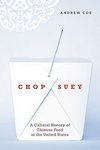 978-0195331073 – Hardcover – Oxford University Press – $24.95
978-0195331073 – Hardcover – Oxford University Press – $24.95
Andrew Coe is a very fine writer indeed – his experience as a journalist shows. Like Mark Kurlansky (Cod, still one of my favorite books among many others he has written), Andrew takes deeply researched historical information and presents them smoothly, telling stories that are packed with fascinating details to bring a subject we think we know into much clearer perspective.
In Chop Suey, Coe takes us on a long journey, beginning in 1784 with the earliest contacts between Americans and China. Throughout, it is hard not to be surprised and sometimes embarrassed by the incredible self centered and disrespectful Americans. At times they were better at understanding and working with the absolute foreignness of Chinese culture and experience than were the Europeans, but only marginally so. At the time the first wave of Chinese immigrants came to America in the mid-19th century, only a few Americans knew anything meaningful or substantive about China and the Chinese, and much of what they did “know” was untrue or seriously exaggerated. And later, American xenophobia reached astonishing heights, as Coe documents, with the now forgotten banning of citizenship to Chinese people who had as much right to be here as any other immigrants.
The gulf of understanding between Americans and Chinese had a great deal to do with the way Chinese food was received in this country, but Coe documents in compelling detail, the way that Chinese cuisine came to become the integral part of the American cuisine that it is today, with over 40,000 Chinese restaurants of many different kinds. With the gradual Chinese migration to the East Coast, eventually New York “Bohemians” discovered Chinese restaurants, and made wildly popular, the seemingly new dish, chop suey. In fact, according to Coe, it was a peasant cuisine from one part of China that came to dominate Chinese-American restaurants.
There are many great stories along the way to where we are today. Coe talks about how American Jews fell in love with Chinese restaurants and in particular makes a great story of President Richard Nixon’s 1972 trip to China and how it opened minds and palates across America. This was a particularly fun part of the book for me. For anyone who loves food of any kind, and especially the intersection of food and culture, this book will be a pleasure to read.
Talking to Andrew was a pleasure. He gives a terrific interview – fully in command of his subject, and really fun to talk with. I think that hearing our discussion will encourage readers to seek out this wonderful book. I am certainly looking forward to his next book.
Podcast: Play in new window | Download
Tony Horwitz: A Voyage Long and Strange: On the Trail of Vikings, Conquistadors, Lost Colonists, and Other Adventurers in Early America
November 2, 2009 by David
Filed under Non-Fiction
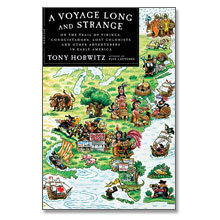 978-0312428327 – Paperback – Picador – $18.00
978-0312428327 – Paperback – Picador – $18.00
What a great book! This is one of those modern nonfiction books by a really smart and talented writer that communicates a great deal of information almost effortlessly. Tony Horwitz takes us on a wonderful journey, his own individualistic, funny, sometimes painful, and always fascinating tour of North American history. It all started with a chance visit to Plymouth Rock that made him realize how little he knew about the early colonization and settlement of North America before the Pilgrims arrival in 1620. It wasn’t long before he set out on a very long journey, as he puts it “in the footsteps of the many Europeans who preceded the Pilgrims to America.”
He traces many stories and visits many places on his own epic trek — from Florida’s Fountain of Youth to Plymouth’s sacred Rock, from desert pueblos to subarctic sweat lodges. Tony has a healthy regard for history and an equally healthy disregard for accepting the accepted wisdom and stories about the Europeans of all kinds who managed to get to America, muck about the place, sometimes with disastrous or horrific results, and he does not forget to talk about the people who were already here when the Europeans arrived. Overall, he is funny, tells great stories, brilliantly illuminates the people, places and myths that dot our past, and while it is trite to say, he definitely brings a long run of history vividly to life. For those of us who do know our American history, this book is fun and rewarding, and for those who missed it, I can think of no better way to learn about this early period of North American history up close and personal than to read A Voyage Long and Strange.
I heard Tony talk about this book and read from it at the Martha’s Vineyard Book Festival this summer and knew instantly that I wanted to read it myself. He definitely has one of the most engaging approaches to history and story telling you will ever run across. Probably reflecting his own engaging personality, as my interview with Tony will show you. He has a great website with alot of information about this, his newest book, and his other four books at www.tonyhorwitz.com.
Podcast: Play in new window | Download

